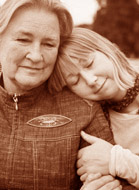HOW TOBE AN EFFECTIVE CAREGIVER Information and Support for Caregivers Caregiving is the most important and challenging job an individual will ever have. Below are some steps that individuals can take to be effective caregivers. Work and communicate effectively with the patient. Caregivers care for patients who must deal with the physical effects of the disease and medicine, as well as the psychological and social challenges of living with cancer. Support for the cancer patient includes efforts to: • Create a climate that encourages and supports sharing feelings.
Work with family and friends. Caregivers should not try to do everything themselves. They should ask for help. Others may want to help but need to be told how. It is important to be clear with these helpers about what they could do to be helpful, as well as the limits of what is expected of them. Friends and family can go grocery shopping, pick up children at school, etc. Take care of your own needs and feelings. Caregivers need to be at their best if they are to provide the best care. Caregivers must pay attention to their own needs as well as those of the person they are helping if they are to be effective. Caregivers should set limits on what can be reasonably expected of them. They should take time off to care for themselves and ask for help before stress builds. • Try not to make important decisions while upset. For information on these programs in your area, call the American Cancer Society at 1-800- ACS-2345 or visit their Web site at www.cancer.org |
|
....If you’re assisting a relative or friend over 60 or, you’re over 60 yourself and are the primary caregiver for a relative under 18. Either way, you don’t have to go it alone. The AIS Family Caregiver Support Program is at your side, and on your side. We can help you find the resources you need for training, assistance, support, assessment, and legal services. Call 1-800-510-2020 |
|
|
|
Bienvenido a la primer revista dedicada al cuidado de la salud
 info
info
The first, the best & the only English & Spanish Magazine in San Diego, California
ALZHEIMERS |
|
|
|
|
|
May is Hispanic Alzheimer's Awaress Month |
|
Effects of Alzheimer’s Disease on Spousal Caregiver |
|
CARGEIVING |
|
Who will speak for you when you can't? |
|
|
|
|
|
|
|
|
|
Free Conference for family caregivers
Learn tips about hands-on care and transfer techniques.Free continental breakfast and lunch plus information and resources. Date: Tuesday, June 26 2007 Time: 8:30 a.m. to 2:30 p.m. Place: Silverado Senior Living 335 Saxony Road, Encinitas CA 92024 Reservations required. for reservations call Southern Caregiver Resource Center Call 1-800-827-1008 |
|
|
|



